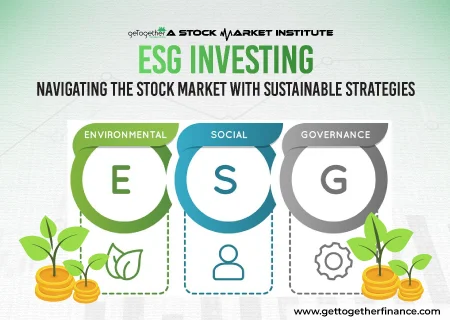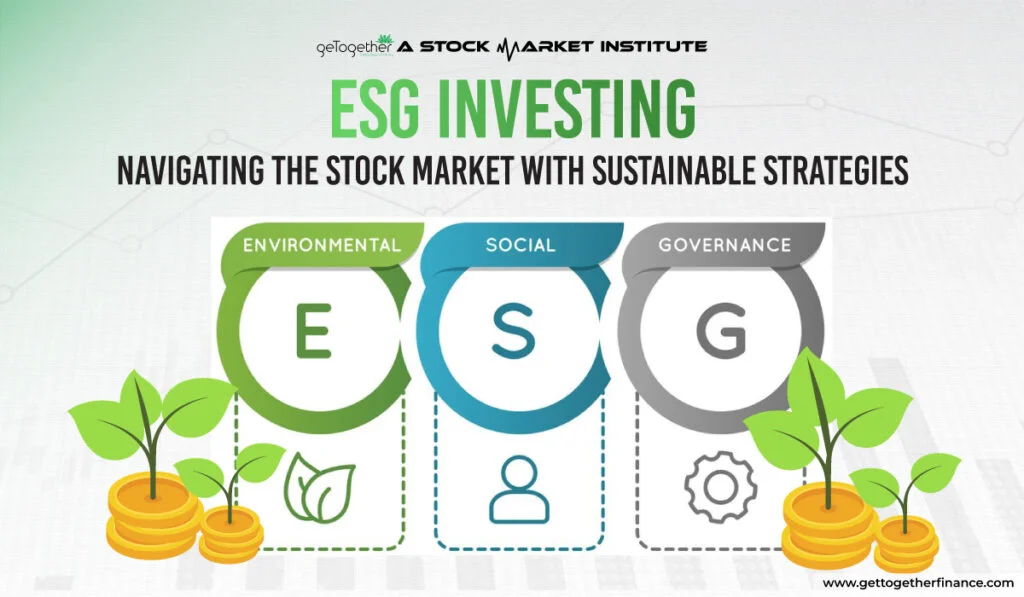ESG Investing: Navigating the Stock Market with Sustainable Strategies


ESG investing means environmental, social, and governance investing done by a company. It is one of the well-known investment approaches that take into consideration about company’s environmental social and governance responsibilities into account. In this investment look at how the company is handling the business by keeping in line with environmental and climate change issues. Followingly it sees how the company is in its social responsibilities like labour practice and transparency and its management. Further analysis is about how the company is working by following the rules and regulations. The goal of ESG investing is not only to invest in financially strong stocks but also to invest in the stocks that are associated with companies that are working in line with the needs of the environment and protecting in whatever way they can.
Approach of EST investing has increased very much from the past ticket as investors and people around the world are realising the importance of sustainability. This rise is the result of increased awareness of environmental issues, social justice and corporate accountability. At this time, many investors believe that companies with reliable and ethical ESG management and practises have more chance of gaining the trust of people And turn out to be successful in long-term.
Table of Contents
ToggleThe Components of ESG Criteria

Environmental Factors
Environmental factors in ESG investing focus on how a company impacts the environment or nature. This includes the systematic approach towards climate change, rescue deletions and allocation, waste management, and pollution.
Companies are evaluated based on the:
- Carbon footprint they creating
- Energy efficiency practices they are incorporating
- Water management practices
Let’s understand this with an example, a company that is regularly reducing its greenhouse gas emissions and investing in renewable energy. Resources will always be in good terms in environmental criteria. Another aspect of environmental factors can include company efforts to minimise deforestation, ensure sustainable land use and protect biodiversity. At the end, investor search for the companies that take aggressive steps to reduce their environmental impact in negative way and contribute to more sustainable world.
Social Factors
Social factors take into account how a company manages relationships with its employees, suppliers, customers, and communities involved in business. This can include labor management, employee health, employee safety, diversity, and human rights.to excel in this criteria companies to:
- Fair wages for employees
- Safe working environment
- Equal opportunities for all
- Impact on communities it works in
- Should do charitable contributions
- Excellent community management.
Customer satisfaction, data protection, and product safety are also critical elements. Investors look for companies with excellent social policies and practices that create positive social results and foster goodwill among stakeholders.
Governance Factors
Governance factors focus on how a company is running its internal policies and how much control it possesses over it. Governance factors include:
- The structure and effectiveness of the company’s board of directors,
- Executive compensation
- Audit practices and shareholder rights
- Transparency in the company
- Accountability
- Ethical behavior
All these are key components of good governance.
Companies that have diverse and independent boards, transparent and equitable CEO pay structures, and strong risk management processes are considered good on governance metrics.
The company also needs to follow anti corruption measures and stick to the rules and regulations. Investors are always in search of companies with good government governance framework, which are well managed and less susceptible to scandals and financial mismanagement.
Together, these ESG components provide a full picture of a company’s environmental and ethical effects, directing investors toward responsible and potentially more secure investments.
Why ESG Matters in the Stock Market

Now that you’ve understood what ESC investing is, let’s know why ESG matters in the stock market.
The Financial Case for ESG Investing
EST investing is not simply about caring for the environment. It has many other financial benefits to point companies that have strong ESG regulations are set to be better managed at internal levels and are less likely to be restored with some risk and regulatory fines.
Also it is said that companies with stable EST practices are now having stable cash flows and higher operation efficiency. This is because of the transparency that they follow. This at the end makes the better and improves long-term performance of the company and eventually stock. Many researches are showing that companies focused on EST are often working better than non-ESG competitors. The reason behind is EST companies are more adaptable to changing market conditions and market environment, which at the end when the heart of customers.
The Ethical and Social Impact
Apart from financial benefits, ESG investing addresses ethical and social concerns. These are:
- With investing in stocks of ESG companies Investors can influence positive change by directing capital towards companies that prioritize environmental sustainability, social responsibility, and good governance.
- This in the end can improve corporate behaviour and practises of the company, which includes reducing carbon footprint, promoting transparency at internal levels and ensuring fair labour or worker practises
- ESG investing goal, hand, and hand with a investor who want to invest in companies that are in support of society, well-being.
- By studying ESG factors, investors can help in creating a world that is more sustainable and reliable in terms of business. By studying ESG factors, investors can help in creating a world that is more sustainable and reliable in terms of business.
ESG Investment Products

ESG Mutual Funds
The main aim of an ESG mutual fund is to collect money from investors and invest in a portfolio of stocks or companies that meet the basic and above ESG requirements. These funds are managed by highly educated fund managers who have experience in the same field. Fund managers select companies based on their performance related to ESG and other financial metrics. ESG mutual funds are an excellent way to support sustainable and ethical companies while also letting your money grow with them. There are various types that come in ESG investment mutual funds. They actively manage funds where the managers make active strategic decisions to add and let go of the stocks that are not fitting the criteria.
ESG ETFs
ESG exchange-traded funds ( ETF) are similar to ones. But they are traded live in the stock exchanges. ESG ETF are based on the mutual funds of ESG just that they can be traded live on stock exchanges and entry and exits can be taken whenever a trader or investor wants.
Top ESG stocks to Invest in 2025

| Stock | Market Cap (rs) |
| INFY | ₹7,98,087 Cr |
| Lupin | ₹97,971 Cr |
| Nestle | ₹2,08,629 Cr |
| Hindalco | ₹1,39,923 Cr |
| DLF | ₹2,05,624 Cr |
| ICICIGI | ₹93,792 Cr |
| Vakrangee | ₹3,533 Cr |
Technical Analysis for ESG Investing

Here’s the step-by-step guide to this:
- The first and foremost step is to find ESG stocks. This means finding stocks that are related to companies that follow ESG guidelines.
- Then analyze the candlestick charts of these stocks by applying the demand and supply theory.
- This strategy and theory will help you find good entry and exit points for investments and trading purposes.
- At last, apply appropriate risk management strategies in every trade you take. To learn the smartest, best and simplest risk management refer to the 10th episode (link).
At Last
EST. Investing is one of the best ways to connect ethical and sustainable values along with making money via stock market. By knowing the environmental social and government factors of the company, investors can choose the companies that are not only financially stable but also environmentally sustainable. The growing popularity of ESG mutual funds and ETF reflects a good and better train towards investment engagement that also supports the green world. Also, ESG investment approach not only reduces the risk factor but also increases the profitability for investors. It significantly promotes the positive corporate behaviour which eventually brings out the better society.
Frequently Asked Questions
What is ESG Investing?
EST investing is about making investments based on companies, environmental social and government practises. It is done to invest in firms that are not only financially good, but also ethical sustainability. Good.
Why has ESG investing gained popularity in recent years?
The increase in ESG investing is because of increase knowledge of people regarding environmental challenges, social justice and corporate responsibility that a company needs to follow. Today many investors believe that companies that have excellent EST policies are going to be more successful.
What are ESG Mutual Funds and ESG ETFs?
ESG mutual fund collect clients money to invest in a diverse portfolio of companies that fit good in EST criteria. These are managed by professional fun managers. On the other hand, ESG ETS are similar, except the difference is that they can be traded live on stock exchanges Alongside individual stocks which provides flexibility to the investor.
What are Green Bonds?
Green bonds are fixed-income instruments used to fund environmentally friendly projects such as renewable energy and sustainable water management. They provide funding for green activities while delivering investors consistent profits.
How does ESG investing benefit investors and society?
ESG investing reduces portfolio risk and achieves long-term profits by focusing on well-managed companies. It also encourages ethical business behavior, which promotes environmental sustainability, social responsibility, and good governance, ultimately benefiting society as a whole.



 Instagram
Instagram
